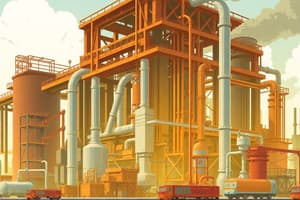Podcast
Questions and Answers
Which type of industry is primarily focused on converting raw materials directly obtained from nature?
Which type of industry is primarily focused on converting raw materials directly obtained from nature?
- Secondary Industries
- Manufacturing Industries
- Primary Industries (correct)
- Tertiary Industries
What term is used for products that have been processed to increase their utility and value?
What term is used for products that have been processed to increase their utility and value?
- Primary Products
- Natural Resources
- Value-Added Products (correct)
- Basic Goods
Which industry category provides services rather than manufacturing goods?
Which industry category provides services rather than manufacturing goods?
- Primary Industries
- Secondary Industries
- Tertiary Industries (correct)
- Extractive Industries
Which of the following best describes Secondary Industries?
Which of the following best describes Secondary Industries?
What is the main difference between primary products and value-added products?
What is the main difference between primary products and value-added products?
Flashcards
Industry
Industry
Economic activity converting raw materials into goods or services for sale.
Manufacturing
Manufacturing
Process of changing raw materials into finished products.
Primary Industry
Primary Industry
Industry directly obtaining products from nature (mining, farming, lumbering).
Secondary Industry
Secondary Industry
Signup and view all the flashcards
Tertiary Industry
Tertiary Industry
Signup and view all the flashcards
Primary Products
Primary Products
Signup and view all the flashcards
Value-Added Products
Value-Added Products
Signup and view all the flashcards
Study Notes
Industries
- Industries are economic activities transforming raw materials into goods or services for markets.
- These activities are called manufacturing.
- Industries are categorized by their products or services.
Learning Outcomes
- The study will cover the necessity of industries.
- Various industrial types will be presented.
- Factors affecting industrial establishment will be discussed.
- Major industries globally will be highlighted.
- Environmental impact of industries will be examined.
Introduction
- Industry involves converting raw materials into goods or services for local or global markets.
- The process of converting raw materials is called manufacturing.
- Industries are categorized based on the principal product manufactured or service delivered.
- Three major industrial types are: Primary, Secondary, and Tertiary.
Primary Industries
- Directly take resources from nature.
- Examples include mining, farming, and logging.
- Products obtained from these are called primary products.
Secondary Industries
- Process primary products into other products.
- Increases product utility and value, often called value-added products.
Tertiary Industries
- Provide services instead of goods.
- Examples are education, banking, and healthcare.
Difference Between Primary and Value-Added Products
- Primary Products: derived directly from nature.
- Value-Added Products: processed to increase utility and value.
Studying That Suits You
Use AI to generate personalized quizzes and flashcards to suit your learning preferences.




